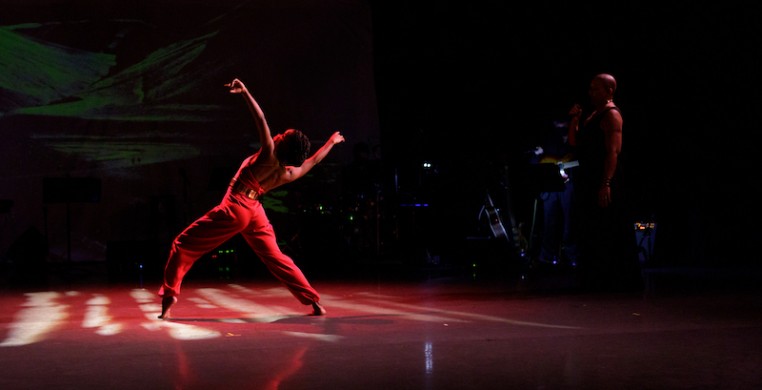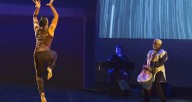OK, y’all better dance. That’s what I whispered to myself Thursday as I sank deeper in my chair witnessing the multi-dimensional opening number of Cerqua Rivera Dance Theatre’s 2021 season in partnership with Epiphany Center for the Arts. From the convenience of my home, I watched the previews to many of their new works via a three-camera live stream.
West African percussionist Paul Cotton — in collaboration with composer and half of Cerqua’s namesake, co-founder Joe Cerqua — led a profound, live percussive pulse in the first piece: “ROOT: mwanzo wa mwili ni roho” (which translates to “the beginning of the body is spirit”). The fusion of traditional West African djembe rhythms with a classic American jazz band felt energetic — like they simply belong together. Choreographed by jazz dance specialist Monique Haley, intuitively, "ROOT" felt familiar. But to see Cerqua Rivera embody this truth brought it home.
Centered in the middle of the white spotlight was soloist Shelby Moran Amarantos, grounded and connected to the earth below the stage and the heavens above the ceiling. My focus shifted to the projection of a tree’s roots on a screen behind the performers and a tree-like lace texturing costumes designed by Jordan Ross. Amarantos plies deeply and back bends, moving with fluidity across the stage. I had an “aha” moment as I watched four additional dancers ripple between the fusion of trumpet notes to join Amarantos.
This is jazz, and it’s everything. It’s the percussion; the liberated lower body; the syncopation and Latin, Indigenous, European and West African influences. It’s the cross-cultural conversation taking place between spirit, body and culture. The dancing quintet brought their individual complexities, cultures and experiences to the Chicago stage and spoke one love language: jazz.
I loved “ROOT” as an opening number, as it set the tone for the rest of the evening. You truly saw the spirit of Cerqua take up space.
Sweeping through each following piece (which included selections by Katlin Bourgeois, Wilfredo Rivera and Shannon Alvis) was a movement quality that deeply resembled CRDT artistic director and co-founder Rivera’s style: quick, nimble and encompassing the breath of the full body. Although there were eight additional works in the performance — ranging in topics from Africanism perspectives, Black Lives Matter, queer identities and resilience — my mind continues to reflect on “Culture Loop” in the second half of the evening, also choreographed by the brilliant Haley and featuring matter-of-fact spoken word written by Shea Glover and recited by Marti Gobel. Soloist Simone Stevens was situated under a red spotlight, appearing to move with a heavy heart. Together, with the sounds of a heartbeat, Stevens brings Glover’s words to life with contemporary jazz phrases, moving as if she is the imagination of Gobel as she walks with vocalist Margaret Murphy-Webb, who sings over the text in a floor length black dress on stage.
Gobel takes us through a typical day of being Black and female in America, how we constantly wake up to traumatizing news and are expected to carry on with business as usual. It felt like a conversation you have with your homegirls, so it definitely brought up some triggering emotions for me. Yet, at the end of the day, I’m especially grateful that our stories are being documented from our perspective.
Cerqua Rivera Dance Theatre has been filling up performance halls for the past 20 years, not just with an audience but with an eclectic live band and a kind of ease that inspires you to stretch what you know about jazz dance and an ever-changing world. They have mastered interdisciplinary performance with seamless collaborations; they seem to possess a blended magic that is difficult to come by. I’ll say, a strong component of that unification is that they work on a piece for two to three years. I’m happy for Cerqua Rivera, excited for dance in Chicago, post-pandemic, curious about the contemporary evolution of jazz dance and inspired by the company’s resilience during this time.
I ended last night’s performance, the same way it began: “Cerqua Rivera, y’all better dance!”


